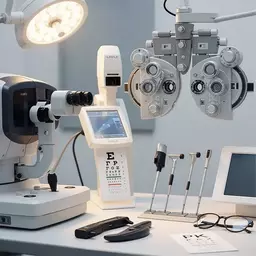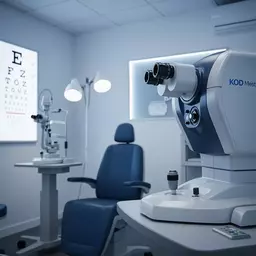Understanding Laser Eye Surgery Costs

As you consider laser eye surgery, it's crucial to understand the financial implications and what to expect. The costs can vary widely based on several factors, and being informed will empower you to make the best decision for your vision needs.
What You Will Learn
- The primary factors influencing the cost of laser eye surgery, including surgeon experience and technology used.
- A breakdown of costs associated with different procedures like LASIK, PRK, SMILE, and LASEK.
- What is typically included in the overall surgery cost, such as surgeon fees and post-operative care.
- Common exclusions and potential hidden fees that may arise in the pricing structure.
- Financing options available, including the use of HSA and FSA for medical expenses.
- How to choose the right surgeon by evaluating credentials and patient reviews for quality care.
- Considerations for long-term costs and benefits of surgery compared to ongoing expenses for glasses or contacts.
Cost Breakdown of Laser Eye Surgical Procedures
This visual provides a clear overview of the typical cost ranges for different laser eye surgery procedures, along with factors influencing these prices.
Procedure Cost Ranges (Per Eye)
Key Cost Influencers
- Surgeon Experience & Reputation
- Technology Used in Procedures
- Geographic Location
- Complexity of Vision Correction
What's Typically Included
- Surgeon Fees
- Technology & Equipment Use
- Pre-operative Evaluations
- Post-operative Care & Follow-ups
Potential Exclusions
- Hidden Fees (e.g., extra tests)
- Prescription Medications
- Specific Post-Op Care
- Insurance Coverage Limitations
Understanding Laser Eye Surgery Costs: An Essential Guide
When considering laser eye surgery, understanding the cost factors is crucial to making an informed decision. Many patients find themselves asking, "What influences the price of surgery?" or "How can I ensure I'm not missing any hidden costs?" Let's explore these questions and break down the complexities surrounding laser eye surgery costs together!
Before diving into specifics, it’s essential to recognize that various elements can impact the overall price. Understanding these factors not only helps you prepare financially but also empowers you to navigate the conversation with your eye surgeon more confidently. For a comprehensive look at what drives these prices, refer to our article on factors affecting laser eye surgery cost.
What Influences Laser Eye Surgery Cost?
Several factors come into play when determining the cost of laser eye surgery. Here are the key influencers:
- Surgeon Experience and Reputation: The qualifications and track record of your surgeon can significantly affect pricing.
- Technology Used in Procedures: Different procedures leverage varying technologies, which can also impact costs.
- Geographic Location and Its Impact on Pricing: The region where you receive treatment may lead to price differences.
- Complexity of Vision Correction Required: More complex cases often necessitate additional resources and time, which can raise costs.
Each of these factors plays a vital role in shaping the total cost you might encounter. For instance, a surgeon with a stellar reputation may charge more for their expertise, reflecting the premium experience they offer their patients.
Surgeon Experience and Reputation
Your surgeon's experience is one of the most significant factors affecting the cost of laser eye surgery. Surgeons with extensive training and a proven track record often command higher fees due to their expertise. When researching your options, consider looking for reviews or testimonials from previous patients to get a sense of their satisfaction. It’s also wise to consult with a few surgeons to compare their credentials and experiences.
Technology Used in Procedures
The technology employed during your surgery can lead to variances in costs. Advanced laser systems, such as those used in LASIK or SMILE procedures, may come at a higher price point due to their precision and effectiveness. Investing in these advanced technologies can often lead to a smoother recovery and better outcomes, making them worth considering despite the higher initial cost.
Geographic Location and Its Impact on Pricing
Where you live can also influence the cost of laser eye surgery. Major cities may have higher prices due to increased demand and operating costs. Conversely, clinics in smaller towns might offer competitive pricing options. It's beneficial to research various clinics in different areas, as you may find a reputable surgeon offering quality care at a more affordable rate.
Complexity of Vision Correction Required
The complexity of your vision correction needs can significantly impact surgery costs. For example, if you require additional treatments or have unique eye conditions, expect additional fees for the specialized care involved. It’s essential to have an open discussion with your surgeon about your specific needs. This conversation can help clarify what to expect regarding costs and ensure that your treatment plan aligns with your vision goals.
Detailed Cost Breakdown by Procedure Type
Understanding the costs associated with different laser eye surgery procedures is crucial for budgeting. Here's a brief overview:
- LASIK Cost Overview: Typically ranges from $2,000 to $3,000 per eye.
- PRK Pricing Insights: Generally costs between $1,500 and $2,500 per eye.
- SMILE Procedure Cost Analysis: Usually falls around $2,500 to $3,500 per eye.
- LASEK Pricing Explanation: Costs can vary from $1,500 to $3,000 per eye.
These ranges provide a framework for understanding what you might expect to pay. However, be sure to consult with clinics directly for precise quotes and what services are included in those prices. To delve deeper into the specifics of each procedure's expenses, check out our laser eye surgery cost breakdown.
LASIK Cost Overview
LASIK is one of the most popular procedures, known for its quick recovery and effectiveness. While initial costs may appear high, many patients find the long-term benefits—such as reduced need for glasses or contact lenses—make it a worthwhile investment. At VisionCost Insights, we emphasize the importance of evaluating all factors before making a final decision.
PRK Pricing Insights
PRK may be priced slightly lower than LASIK but is still a reputable option for vision correction. It’s essential to consider factors like recovery time and post-operative care when thinking about this option. PRK is ideal for patients with thinner corneas or specific eye conditions, so consulting a knowledgeable surgeon can help clarify if it’s suitable for you.
SMILE Procedure Cost Analysis
SMILE is a newer technology that offers a minimally invasive approach to vision correction. While it may come at a higher price, many patients appreciate its advantages, such as less discomfort and faster healing times. Understanding these benefits can help you weigh whether SMILE is the right choice for your eyes and your budget.
LASEK Pricing Explanation
LASEK is similar to LASIK and PRK but involves a slightly different technique. This option may also be priced competitively, so it's worth investigating if you are considering alternatives to LASIK. Remember, every patient's needs are unique, and a thorough consultation will assist in determining the best procedure for you.
What’s Included in Your Laser Eye Surgery Cost?
Understanding what your surgery cost covers is equally important. Here’s what to expect:
- Surgeon Fees and Their Justification: Typically includes the surgeon’s time, expertise, and post-operative care.
- Technology and Equipment Use Explained: The cost of advanced machines and tools should be factored in.
- Pre-operative Evaluation Costs: Initial consultations and necessary tests are often part of the total.
- Post-operative Care and Follow-Up Expenses: This should include follow-up visits to ensure proper healing.
Knowing what’s included in your costs can help you avoid unexpected surprises later on. Make sure to clarify these details during your initial consultations!
Surgeon Fees and Their Justification
The fees charged by your surgeon reflect their skill, experience, and the complexity of your procedure. It’s crucial to understand that investing in a quality surgeon can have lasting benefits for your eye health and overall satisfaction. At VisionCost Insights, I always encourage patients to prioritize experience and outcomes when selecting a surgeon.
Technology and Equipment Use Explained
Modern laser eye surgeries utilize advanced technology which can significantly enhance precision and safety. The costs associated with this technology are typically reflected in the total pricing. Make sure to ask about the specific types of lasers and tools that will be used during your procedure to fully understand the value you are receiving.
Pre-operative Evaluation Costs
Before your surgery, you'll undergo a thorough evaluation to determine your candidacy. These initial assessments might include eye exams, imaging, and consultations. Keep in mind that these costs can vary depending on the clinic, so it’s wise to inquire about them upfront.
Post-operative Care and Follow-Up Expenses
After surgery, follow-up care is essential to ensure your eyes heal properly. Be sure to ask what post-operative expenses are included in your overall price. Understanding this can give you peace of mind knowing that you will receive the care you need after your procedure.
Understanding What’s Not Included in the Cost
While it’s vital to understand what is covered in your surgery cost, it’s equally important to recognize potential exclusions. Here are some common areas to keep in mind:
- Potential Hidden Fees: What to Watch For: Look out for additional charges that may arise during the process.
- Medications and Post-Op Care Exclusions: Prescription medications and certain types of care might not be included.
- Insurance Coverage Limitations Explained: Many insurance plans have restrictions on laser eye surgery coverage.
Being aware of these exclusions can help you budget more effectively and prevent unexpected expenses. Always ask your clinic about what isn’t included in your quoted price!
Potential Hidden Fees: What to Watch For
Some clinics may charge for consultations, evaluations, or even diagnostic tests that are often considered additional. Understanding these potential hidden fees upfront can help you avoid any unpleasant surprises later. Staying informed is crucial, and it’s perfectly acceptable to ask questions!
Medications and Post-Op Care Exclusions
After your surgery, you may need medications for pain relief or to assist with healing, which could be an additional cost. Ensure that you discuss medication requirements with your surgeon ahead of time to factor those costs into your budget.
Insurance Coverage Limitations Explained
Many insurance companies do not cover laser eye surgery, and even when they do, there may be limitations. It's important to check with your insurance provider about what costs they will cover. Sometimes, they may only contribute to part of the pre-operative evaluations or follow-up care. Clarifying these details will ensure that you're not left with unexpected bills!
Financing Options and Insurance Considerations
Financing laser eye surgery can make the procedure more accessible. Here are some options to consider:
- How to Use HSA and FSA for Surgical Costs: Health Savings Accounts (HSA) and Flexible Spending Accounts (FSA) can be great resources.
- Exploring Payment Plans and Financing Solutions: Many clinics offer payment plans or financing options to help manage costs.
Understanding available financing options can provide you with flexibility in managing your laser eye surgery costs. Be sure to ask your clinic about their financing solutions during your consultations!
How to Use HSA and FSA for Surgical Costs
Using HSA or FSA funds for your laser eye surgery can significantly reduce your out-of-pocket expenses. These accounts allow you to set aside pre-tax dollars for qualified medical expenses. Be sure to check with your plan administrator to understand the eligibility of your procedure.
Exploring Payment Plans and Financing Solutions
Many clinics recognize that the cost of laser eye surgery can be a barrier, so they offer financing options to help. Discussing payment plans with your clinic can lead to manageable monthly payments instead of a lump sum, making the procedure more affordable. Don’t hesitate to inquire about these options during your consultations.
Choosing the Right Surgeon: Quality vs. Cost
Finding the right balance between cost and quality is essential. Here’s how to approach this decision:
- Importance of Surgeon Credentials and Reviews: Always look for a qualified surgeon with verified credentials.
- How to Assess Value Beyond Price: Consider the overall experience and outcomes rather than just the cost.
Choosing a surgeon based solely on cost can lead to regrettable outcomes. Investing in a skilled professional may ultimately save you from additional expenses and health issues down the line. To learn more about selecting the right provider, read our guide on choosing laser eye surgery providers.
Importance of Surgeon Credentials and Reviews
It’s essential to verify the credentials and reputation of your surgeon. Look for board certifications and read patient reviews to gauge satisfaction levels. A well-reviewed surgeon often reflects a commitment to quality care, a valuable aspect to consider when making your choice.
How to Assess Value Beyond Price
When evaluating your options, consider factors such as the surgeon’s experience, the clinic’s technology, and patient reviews. Sometimes, paying a bit more can translate into significantly better outcomes and experiences. Keep this in mind as you weigh your options!
Comparing Costs Across Different Eye Clinics
As you explore your options, it’s helpful to compare costs among various clinics. Here’s what to look for:
- Analyzing Cost Variance by Geographic Location: Prices can differ widely by region, so be sure to research.
- Understanding Treatment Packages and Promotions: Some clinics may offer special packages or discounts.
Being proactive in your research can help you find the best deal while ensuring you don’t compromise on quality.
Analyzing Cost Variance by Geographic Location
Prices can vary significantly depending on where you live. Major cities often charge higher rates due to increased demand, while rural areas may offer more competitive pricing. Don’t hesitate to look beyond your immediate location for potential savings.
Understanding Treatment Packages and Promotions
Some clinics might offer bundled services or promotional pricing, which can make your surgery more affordable. Be sure to ask about any available discounts or packages that could help lower your overall costs. At VisionCost Insights, we advocate for exploring all options to ensure financial accessibility to laser eye surgery.
Evaluating Long-Term Costs and Benefits of Laser Eye Surgery
Lastly, it’s vital to consider the long-term implications of your investment in laser eye surgery. Here are two key factors:
- Assessing Out-of-Pocket Expenses Over Time: Think about how much you’ll save in the long run by not needing glasses or contacts.
- Understanding Recovery Time and Potential Complications: Be prepared for the recovery process and any associated costs.
Evaluating these long-term factors can help you determine whether laser eye surgery is a worthwhile investment for your vision and lifestyle.
Assessing Out-of-Pocket Expenses Over Time
Think about the cumulative costs of glasses or contacts over the years. For many, investing in laser eye surgery results in significant savings over time. It’s essential to weigh these long-term savings against the initial investment.
Understanding Recovery Time and Potential Complications
Recovery can vary by individual and procedure type, so understanding the timeline is essential for planning. Make sure to discuss potential complications and their costs with your surgeon ahead of time. Being well-informed will help you prepare for any unexpected situations.
Pro Tip
When preparing for laser eye surgery, always ask your surgeon about potential financing options and payment plans. Many clinics offer flexible solutions that can make the costs more manageable, allowing you to focus on achieving clearer vision without financial stress.
Summarizing Laser Eye Surgery Costs and Considerations
As we conclude our exploration of laser eye surgery costs, it's essential to reflect on the overall value this investment offers. Many potential patients wonder if the upfront expenses truly translate into long-term benefits. In my experience as an ophthalmologist, I’ve seen countless patients regain their vision and independence, which often outweighs the financial commitment involved. So, how do we weigh these important factors?
Here’s a quick summary of the key considerations when assessing laser eye surgery:
- Evaluate potential long-term savings on glasses or contacts.
- Consider the enhanced quality of life that comes with improved vision.
- Think about the peace of mind from knowing you made an informed decision.
Each of these factors plays a crucial role in determining whether laser eye surgery is a worthwhile investment for you. While the initial costs may seem daunting, the lasting benefits make it a viable consideration for many individuals seeking vision correction.
Encouraging Consultation for Personalized Cost Assessment
It’s important to remember that every patient’s situation is unique. I highly encourage reaching out for a personalized consultation to discuss your specific needs and circumstances. During these consultations, we can go over detailed cost assessments tailored to your vision requirements.
Moreover, I’m here to answer any questions you may have! To help you prepare for your visit, consider these common questions:
- What are the total costs associated with the procedure I'm considering?
- Are there any financing options available?
- What results can I realistically expect from the surgery?
By asking these questions and facilitating an open dialogue, we can ensure that you leave with a comprehensive understanding of your options and what they entail.
FAQs Addressing Common Cost-Related Questions
Many patients have similar concerns regarding laser eye surgery costs. Here are a few frequently asked questions that I often encounter:
Frequently Asked Questions About Laser Eye Surgery Costs
- What is the average cost of laser eye surgery?
- The cost of laser eye surgery varies by procedure type. LASIK typically ranges from $2,000 to $3,000 per eye, PRK from $1,500 to $2,500, SMILE from $2,500 to $3,500, and LASEK from $1,500 to $3,000 per eye.
- What factors influence the total cost of laser eye surgery?
- Several factors influence the cost, including the surgeon's experience and reputation, the specific technology used, the geographic location of the clinic, and the complexity of your vision correction needs.
- What is usually included in the stated cost of laser eye surgery?
- Typically, the cost includes surgeon fees, the use of advanced technology and equipment, pre-operative evaluations (some clinics), and post-operative care and follow-up visits.
- Are there any hidden fees or exclusions I should be aware of?
- Yes, potential exclusions or hidden fees can include additional diagnostic tests, prescription medications post-surgery, specific post-operative care not covered, and limitations on insurance coverage. Always ask for a detailed breakdown of costs.
- Can I use HSA or FSA funds to pay for laser eye surgery?
- Yes, Health Savings Accounts (HSA) and Flexible Spending Accounts (FSA) can often be used to pay for qualified medical expenses like laser eye surgery, which can help reduce your out-of-pocket costs.
- Are financing options or payment plans available for laser eye surgery?
- Many clinics offer various financing options and payment plans to make the procedure more affordable. It's advisable to discuss these options with your chosen clinic during your consultation.
- How do I choose a surgeon that balances quality and cost?
- Prioritize a surgeon with strong credentials, a good reputation, and positive patient reviews. While cost is a factor, assessing the overall value, including the surgeon's experience and the clinic's technology, is crucial for long-term satisfaction and successful outcomes.
- Is laser eye surgery a worthwhile investment in the long term?
- For many, laser eye surgery is a worthwhile investment due to long-term savings on glasses and contact lenses, improved quality of life, and enhanced visual independence. Consider these benefits against the initial cost.
Final Thoughts on Making Informed Choices
As we wrap up this discussion, my final piece of advice is simple: take your time and do your research! Understanding the costs associated with laser eye surgery is crucial in making a decision that feels right for you. At VisionCost Insights, we pride ourselves on providing transparent information and guidance throughout your vision correction journey. Remember, your clarity of vision is a precious investment!
Patient Testimonials and Surgical Outcomes
Nothing speaks more powerfully than the real experiences of patients who have undergone laser eye surgery. Their testimonials often highlight the significant impact that this procedure can have on one’s life.
Real Experiences: Cost vs. Benefits
Many patients I’ve worked with have echoed similar sentiments regarding the benefits they’ve gained:
- Increased freedom from glasses or contacts.
- Improved participation in sports and outdoor activities.
- Enhanced confidence in daily life.
These stories affirm that while the cost of surgery might seem high initially, the benefits often lead to a much richer quality of life.
Insights from Patients on Financing Options
Several patients have shared their experiences with financing options, emphasizing how these solutions enabled them to proceed with surgery:
- Many found that utilizing Health Savings Accounts (HSA) or Flexible Spending Accounts (FSA) helped reduce their out-of-pocket expenses.
- Others appreciated the clinic’s payment plans, which allowed them to spread costs over time.
- Some opted for third-party financing, which provided additional flexibility.
By exploring these options and hearing from others, potential patients can make choices that fit their financial situations while prioritizing their eye health.
Recap of Key Points
Here is a quick recap of the important points discussed in the article:
- Surgeon Experience and Reputation: Choose a qualified surgeon with verified credentials to ensure quality care.
- Technology Used: Advanced technologies can enhance outcomes but may come at a higher cost.
- Geographic Location: Prices can vary significantly based on where you receive treatment.
- Complexity of Vision Correction: More complex cases may incur additional costs for specialized care.
- Understanding Costs and Inclusions: Clarify what is included in the quoted price and what potential exclusions exist.
- Financing Options: Explore HSA, FSA, and financing plans to manage costs effectively.
- Long-Term Considerations: Assess the potential savings on glasses and the overall quality of life improvements.








